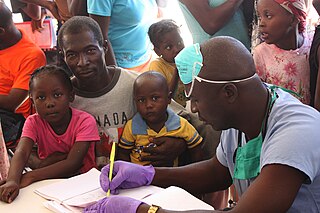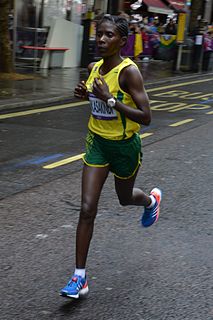Related Research Articles

Lesotho, officially the Kingdom of Lesotho, is a landlocked country enclaved by South Africa. It is situated in the Maloti Mountains and contains the highest mountains in Southern Africa. It has an area of over 30,000 km2 (11,600 sq mi) and has a population of about 2 million.

The economy of Lesotho is based on agriculture, livestock, manufacturing, mining, and depends heavily on inflows of workers’ remittances and receipts from the Southern African Customs Union (SACU). Lesotho is geographically surrounded by South Africa and is economically integrated with it as well. The majority of households subsist on farming. The formal sector employment consist of mainly female workers in the apparel sector. While male migrant laborers work primarily as miners in South Africa for 3 to 9 months and employment in the Government of Lesotho (GOL). Half of the country's population work in informal crop cultivation or animal husbandry.

HIV/AIDS originated in Africa in the early 20th century and is a major public health concern and cause of death in many African countries. AIDS rates vary dramatically although the majority of cases are concentrated in Southern Africa. Although the continent is home to about 15.2 percent of the world's population, more than two-thirds of the total infected worldwide – some 35 million people – were Africans, of whom 15 million have already died. Sub-Saharan Africa alone accounted for an estimated 69 percent of all people living with HIV and 70 percent of all AIDS deaths in 2011. In the countries of sub-Saharan Africa most affected, AIDS has raised death rates and lowered life expectancy among adults between the ages of 20 and 49 by about twenty years. Furthermore, the life expectancy in many parts of Africa is declining, largely as a result of the HIV/AIDS epidemic with life-expectancy in some countries reaching as low as thirty-nine years.

Kona Bikes is a bicycle company based in the Pacific Northwest. The company was founded in 1988 by Dan Gerhard and Jacob Heilbron in Vancouver, BC. Their world headquarters are in Ferndale, Washington, with Canadian distribution offices in Vancouver, and European distribution offices in Monaco.

Partners In Health (PIH) is an international nonprofit public health organization founded in 1987 by Paul Farmer, Ophelia Dahl, Thomas J. White, Todd McCormack, and Jim Yong Kim.

Product Red, stylized as (PRODUCT)RED or (PRODUCT)RED, is a licensed brand by the company Red, stylized as (RED), that seeks to engage the private sector in raising awareness and funds to help eliminate HIV/AIDS in eight African countries, namely Eswatini, Ghana, Kenya, Lesotho, Rwanda, South Africa, Tanzania, and Zambia. It is licensed to partner companies including Apple Inc., Nike, American Express (UK), The Coca-Cola Company, Starbucks, Converse, Electronic Arts, Primark, Head, Buckaroo, Penguin Classics, Gap, Armani, FIAT, Hallmark (US), SAP, Beats Electronics, and Supercell. The concept was founded in 2006 by U2 frontman and activist Bono, together with Bobby Shriver of the One Campaign and DATA. The Global Fund to Fight AIDS, Tuberculosis and Malaria is the recipient of Product Red's money.

28 Stories of AIDS in Africa is a 2007 non-fiction book by Canadian journalist and author Stephanie Nolen. It tells 28 stories of people who have worked tackling HIV/AIDS in healthcare, as advocates, and people who have been diagnosed as HIV positive and their family members.

Proviz is a British company specialising in the design and production of high visibility and reflective sportswear and accessories for cycling and running.
Bikes to Rwanda was a non-profit international aid relief organization established in Portland, Oregon, United States, in 2006 by Stumptown Coffee Roasters founder and CEO Duane Sorenson following a business trip to visit coffee growers' cooperatives in Rwanda.

HIV/AIDS in Lesotho constitutes a very serious threat to Basotho and to Lesotho's economic development. Since its initial detection in 1986, HIV/AIDS has spread at alarming rates in Lesotho. In 2000, King Letsie III declared HIV/AIDS a natural disaster. According to the Joint United Nations Programme on HIV/AIDS (UNAIDS) in 2016, Lesotho's adult prevalence rate of 25% is the second highest in the world, following Eswatini.

Rwanda faces a generalized epidemic, with an HIV prevalence rate of 3.1 percent among adults ages 15 to 49. The prevalence rate has remained relatively stable, with an overall decline since the late 1990s, partly due to improved HIV surveillance methodology. In general, HIV prevalence is higher in urban areas than in rural areas, and women are at higher risk of HIV infection than men. Young women ages 15 to 24 are twice as likely to be infected with HIV as young men in the same age group. Populations at higher risk of HIV infection include people in prostitution and men attending clinics for sexually transmitted infections.

Bicycling is a cycling magazine published by Hearst in Easton, Pennsylvania.

Bicycle use in Portland, Oregon has been growing rapidly, having nearly tripled since 2001; for example, bicycle traffic on four of the Willamette River bridges has increased from 2,855 before 1992 to over 16,000 in 2008, partly due to improved facilities. The Portland Bureau of Transportation says 6% of commuters bike to work in Portland, the highest proportion of any major U.S. city and about 10 times the national average.

World Bicycle Relief is an international, non-profit organization based in Chicago, IL that specializes in large-scale, comprehensive bicycle distribution programs to aid poverty relief in developing countries around the world. Their programs focus primarily on education, economic development, and health care. As of February 2020, World Bicycle Relief has distributed 500,000 bicycles in 21 countries and trained more than 2,300 bicycle mechanics in the developing world. Within their largest program, the Bicycles For Educational Empowerment program, nearly 70 percent of the student bicycles are designated for girl students.
Gisèle Wulfsohn was a South African photographer. Wulfsohn was a newspaper, magazine, and freelance photographer specialising on portrait, education, health and gender issues. She was known for documenting various HIV/AIDS awareness campaigns. She died in 2011 from lung cancer.

Bicycle poverty reduction is the concept that access to bicycles and the transportation infrastructure to support them can dramatically reduce poverty. This has been demonstrated in various pilot projects in South Asia and Africa. Experiments done in Africa and Sri Lanka on hundreds of households have shown that a bicycle can increase the income of a poor family by as much as 35%. Transport, if analyzed for the cost–benefit analysis for rural poverty alleviation, has given one of the best returns in this regard. For example, road investments in India were a staggering 3–10 times more effective than almost all other investments and subsidies in rural economy in the decade of the 1990s. A road can ease transport on a macro level, while bicycle access supports it at the micro level. In that sense, the bicycle can be one of the most effective means to eradicate poverty in poor nations.

Sport in Rwanda is supported by the Rwandan government's Sports Development Policy of October 2012. This argues that sport has a number of benefits, including bringing people together, improving national pride and unity, and improving health. The policy identifies challenges to the development of sport in the country, including limited infrastructure and financial capacity. It sets the "inspirational target" that, by 2020, Rwanda should have "a higher percentage of population playing sport than in any other African nation" and be ranked amongst the top three African countries in basketball, volleyball, cycling, athletics and Paralympic sports, and the top ten in football. It also aims to "foster increased participation of people in traditional sports". According to research published by the University of the Western Cape's Interdisciplinary Centre of Excellence for Sport Science and Development, the most popular sports in Rwanda are association football, volleyball, basketball, athletics and Paralympic sports.

Healthcare in Rwanda was historically of poor quality, but in recent decades has seen great improvement. Rwanda operates a universal health care system, and is considered to have one of the highest-quality health systems in Africa.

Biketown, also known as Biketown PDX, is a bicycle-sharing system in Portland, Oregon, that began operation on July 19, 2016. The system is owned by Portland Bureau of Transportation (PBOT) and operated by Lyft, with Nike, Inc. as the title sponsor. At launch, the system had 100 stations and 1,000 bicycles serving the city's central and eastside neighborhoods, with hopes to expand outward.
Qhubeka is a South African headquartered not-for-profit social mobility Charitable organization which donates Bicycles to schoolchildren and key workers across South Africa and southern Africa. Qhubeka has donated over 105,000 of their unique bicycles to date, funded by several major global corporations, alongside personal donors worldwide. Qhubeka is currently a charity supported by the Tour de France since 2018, and will be supported by the Tour de France Femmes avec Zwift from 2022.
References
- ↑ "Bicycling Magazine's Second Annual Biketown Africa Aims to Improve Health Care in Africa One Bike at a Time". Business Wire. July 24, 2007. Archived from the original on August 16, 2012. Retrieved 2013-07-17.
- ↑ "Details about". apps.irs.gov. Retrieved 2020-10-19.
- ↑ "Going Global: Biketown Africa". Institute for Transportation and Development Policy. March 2, 2006. Retrieved 2013-07-17.
- ↑ Sarah Rich (June 26, 2007). "Kona Biketown Africa". World Changing. Archived from the original on 2012-12-06. Retrieved 2013-07-17.
- ↑ Steve Madden (May 24, 2006). "Kona Africa Bike Delivers Hope". Bicycling. Archived from the original on 2013-10-09. Retrieved 2013-07-17.
- ↑ "Bicycling Magazine Teams with Bristol-Myers Squibb Foundation, Kona Bicycle Company to Launch 'BikeTown Africa'". CSRWire USA. Nov 29, 2005. Retrieved 2013-07-17.
- ↑ "BikeTown Africa". Gandhi's Be Magazine. 2010. Retrieved 2013-07-17.
- ↑ James Startt (2008). "The Road to Chokwe". Bicycling. Archived from the original on 2013-10-03. Retrieved 2013-07-17.
- ↑ "VT Kona BikeTown Africa Fundraising Campaign". Virginia Polytechnic Institute. Archived from the original on 2013-05-07. Retrieved 2013-07-17.
- ↑ "Bicycling BikeTown Africa assists MaAfrika Tikkun". Archived from the original on 2009-04-18. Retrieved 2009-05-20.
- ↑ "Bicycling BikeTown Africa assists Afrika Tikkun". Afrika Tikkun. 2008. Archived from the original on 2013-07-17. Retrieved 2013-07-17.
- ↑ "Foundation Rwanda & BikeTown Africa Bike Build 2010". Foundation Rwanda. 2010. Retrieved 2013-07-17.
- ↑ "Help Send 300 AfricaBikes to Gambia". Bicycle Retailer and Industry News. November 19, 2009. Retrieved 2013-07-17.
- ↑ Karl Rosengarth (2008-03-01). "Kona Biketown Africa In High Gear". Bicycle Times. Archived from the original on 2013-07-17. Retrieved 2013-07-17.
- ↑ "2010 Bikes, Asphalt: AfricaBike Three". Kona Bikes. Archived from the original on 2012-01-31. Retrieved 2013-07-17.
- ↑ "Search results for "AfricaBike"". Rodale.com. Archived from the original on 2013-07-17. Retrieved 2013-07-17.
- ↑ "There are no results for "AfricaBike" in products". Rodales.com. Retrieved 2013-07-17.[ permanent dead link ]
- ↑ "Search Results for Biketown africa: Sorry, no results were found". The Rodale Institute . Retrieved 2013-07-17.
- ↑ "Search Results 1-4 of 4 for BikeTown Africa". Bicycling. July 17, 2013. Retrieved 2013-07-17.[ permanent dead link ]
- ↑ "Ride RAGBRAI with Bicycling's BikeTown Africa". Bicycling. March 13, 2009. Archived from the original on 2013-08-24. Retrieved 2013-07-17.
- ↑ "BikeTown Africa @BikeTownAfrica". Twitter. October 28, 2010. Retrieved 2013-07-17.
- ↑ Maria Rodale (January 4, 2011). "BikeTown Africa: Transforming Rwanda". The Huffington Post . Retrieved 2013-07-17.